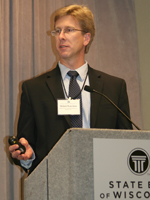Richard Brown, chief judge for the Wisconsin Court of Appeals, attended the State Bar Board of Governors' meeting today in Madison to request co-sponsorship of the ABA Commission on Mental and Physical Disability Law’s resolution to promote equality in law school admissions testing for individuals with disabilities. In this video, Judge Brown explains why the resolution is necessary. The board voted unanimously to co-sponsor the resolution.
Dec. 2, 2011 – The State Bar of Wisconsin will co-sponsor a resolution to promote equality for disabled individuals who apply for and take the Law School Admissions Test (LSAT), the State Bar’s Board of Governors decided today in its meeting at the State Bar Center in Madison.
The resolution, which will be presented to the American Bar Association’s (ABA) House of Delegates at the ABA’s Midyear Meeting in February, was developed by the ABA Commission on Mental and Physical Disability Law.
The board voted unanimously to support the resolution at the request of Richard Brown, chief judge for the Wisconsin Court of Appeals and former chair of the ABA commission, who appeared to brief the board on the issues involved.
John Skilton, the Wisconsin State Delegate to the ABA House of Delegates, also appeared to voice support for the resolution, which urges LSAT administrators to remove current application and testing barriers experienced by individuals with disabilities.
The resolution

Former State Bar President John Skilton, Wisconsin State Delegate to the ABA House of Delegates, asks board to co-sponsor a resolution in support of the ABA Commission on Mental and Physical Disability Law on law school admission tests and access to the legal profession.

Kelly Nickel, Elkhorn, Dues Evaluation Committee member, gives report of committee findings.
Specifically, the resolution urges all entities that administer the LSAT “to provide appropriate accommodations for a test taker with a disability to best ensure that the exam results reflect what the exam is designed to measure, and not the test taker's disability.”
It also urges all entities that administer, score, or report the results of a LSAT “to establish procedures to ensure that the application process, the scoring of the test, and the reporting of test scores is consistent for all applicants and does not differentiate on the basis that an applicant received an accommodation for a disability.”
Finally, the resolution urges all entities that administer the LSAT to make accessible procedures, policies, and guidelines for granting accommodations, give proper notice concerning accommodation requests, and “provide a fair process for timely reconsideration of the denial of requested accommodations.”
In his presentation to the board, Judge Brown noted that other college and post-graduate testing boards, such as medical and graduate school boards, have worked to eliminate the testing barriers that disabled individuals face, but those barriers still exist for LSAT takers.
Judge Brown says LSAT administrators often flag the tests of disabled individuals who have been granted an accommodation and reduce scores based on the accommodation. “There is no correlation that justifies a demerit for having an accommodation,” Judge Brown said. “All this resolution does is give disabled individuals an equal opportunity to take the test.”
Other bar associations, such as the Oregon and Utah state bars and Philadelphia Bar Association, have also signed on to co-sponsor the resolution.
Keller dues reduction amount for FY 2013 approved

The Board of Governors listens to the presentation.
The board approved the Keller dues reduction amount of $8.50 for fiscal year 2013. Under Keller v. State Bar of California, 496 U.S. 1 (1990), the State Bar may not use compulsory dues of any member who objects to activities which are not reasonably intended for the purpose of regulating the legal profession or improving the quality of legal services.
As it does each year, the State Bar determined which activities were subject to the Keller dues reduction. An amount of $168,658 was determined as nonchargeable to mandatory dues. That number was divided by the anticipated 20,046 full dues-paying members for fiscal year 2013, resulting in a calculation of $8.41 (rounded up to $8.50).
Dues Evaluation Committee reports preliminary recommendations
The State Bar’s Dues Evaluation Committee (dues committee), charged with reviewing the State Bar’s existing dues structure to determine whether that structure should be changed, made its preliminary recommendations to the board.
The dues committee recommends a policy that would allow a budget increase in dues to restore the State Bar’s overall reserves to certain levels, if necessary, or a decrease in dues if overall reserves exceed certain amounts that are tied to operating expenses.

Anique Ruiz and Amy Wochos, both of Milwaukee, attend the Board of Governors' meeting.

Mike Waterman presents the Strategic Planning Committee Report.
For more photos, visit the State Bar’s Facebook page, or click here.
The dues committee also recommends a structure that would extend the discount period for “active new” members from three years to five years, and create three categories of “emeritus status” – inactive, active, and emeritus. Any new policy would be reviewed every five years.
Currently, “active new” members pay half the current $224 State Bar dues amount for the first three years of membership; all “emeritus status” members (over age 70) pay no dues.
The dues committee held seven open meetings across the state from September through November and solicited written comments to obtain input from members on the dues structure issue. The open meetings were poorly attended, reported dues committee member Kelly Nickel. However, all input acquired was considered when making the preliminary recommendations.
Based on the board’s discussion, the dues committee will make a final recommendation to the State Bar’s Finance Committee, which will decide whether the recommendations should be presented to the board for a vote at its February 2012 meeting.
Concurrent lobbying positions discussed
The State Bar’s Policy Committee recommends that the board adopt an interpretive policy of existing State Bar rules relating to concurrent lobbying by the State Bar and its sections. It will present final policy language to the board for action at a later date.
That final policy language will reflect that “public policy positions taken by the Board of Governors on behalf of the State Bar of Wisconsin are exclusive of any section positions. Therefore, while sections are encouraged to assist State Bar leadership in lobbying on issues in which it holds particular expertise, sections may not take concurrent positions on which there already exists a State Bar of Wisconsin position.”
Michael Rosenberg, chair of the Legislative Oversight Committee and ad hoc member of the Policy Committee, said that concurrent section lobbying on the same issue has the potential to dilute the strength of State Bar positions.
Rosenberg made clear that the State Bar would continue to rely on section expertise and data to advance State Bar positions that are of mutual interest to specific State Bar sections.
